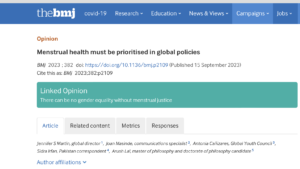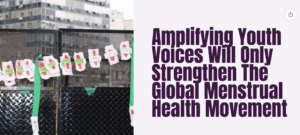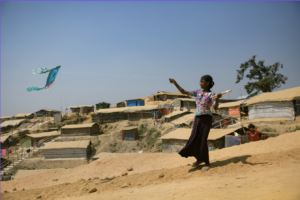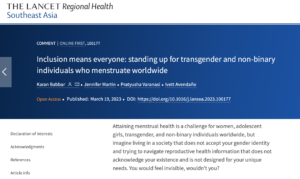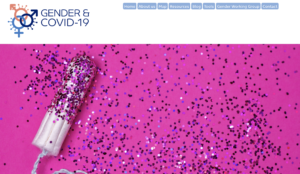Attaining menstrual health is not just a matter of choice, but a cornerstone of equality, dignity, and rights for all. There are approximately 1.8 billion women, adolescent girls, transgender men, people who are intersex, and nonbinary people who experience menstruation [1,2]. Menstrual health is a public health and human rights issue, cutting across eight Sustainable Development Goals (SDGs) (1,3,4,5,6,8,10 and 13) [3][4][5]. Still, the issue remains glaringly absent from high-level discussions, governmental agendas, and policy solutions. We at Pandemic Periods recognise that menstrual health demands more than access to products; it requires comprehensive programmes and policies that confront social determinants like stigma, income inequality, lack of access to comprehensive sexuality education, and inadequate WASH facilities.
The 78th session 2023 of the United Nations General Assembly (UNGA) convenes in New York in mid-September. The current agenda offers inadequate attention to menstrual health. During the UNGA78, the following resolutions that relate to no poverty (SDG1), good health and wellbeing (SDG3), gender equality (SDG5), and economic growth and development (SDG8) will be ascended:
- 19 (c). Disaster risk reduction (resolutions 60/195 and 77/164)
- 19 (g). Education for sustainable development (resolution 76/209)
- 22. Eradication of poverty and other development issues
- 25. Social development (resolutions 56/177, 76/130, 76/132 and 76/133)
- 26 (a). Advancement of women (resolutions 76/140, 76/141 and 77/193)
- 73.Promotion and protection of human rights (resolution 76/153)
None of the above resolutions include menstrual health. Yet, poor menstrual health can be associated with gender-based violence, work and school absences, depression, anxiety, and other adverse personal and socioeconomic outcomes.COVID-19 and the climate crisis exacerbate this access right as the period of poverty widens for women, girls, people with disabilities, and the LGBTQIA+ community. Extreme weather events increase period poverty by not only disrupting the supply chains but also making it difficult for individuals to maintain menstrual health, because they may become displaced, water may be scarce, both affecting access to WASH facilities. Household incomes may be restricted, particularly if families are working in agriculture, and this could reduce their ability to buy products.
The impact of poor menstrual health period poverty and stigma demands the necessity of including menstrual rights in global efforts around gender equality, economic growth, and development, LGBTQIA+ rights, good health and well-being, and climate change.
Menstrual health is a complex issue and requires more than the provision of products. Due to social and financial barriers to achieving menstrual health, all those who menstruate are being denied their basic human rights including economic prosperity, right to education, health, water, sanitation, and gender equality. Many of these human rights have shaped the development framework of the UN SDGs [7]. To achieve these critical milestones by 2030, a compelling imperative arises for integrating menstrual health and rights within the UNGA platform.
Pandemic Periods are resounding calls to world leaders to include menstrual health in discussions surrounding the topics above within the UNGA agenda. By seizing this opportunity to champion the rights and well-being of all those who menstruate, we can catalyse progress across a spectrum of critical global objectives. Let us collectively work towards a future where menstrual health is recognised and upheld as a pivotal driver of sustainable development.


